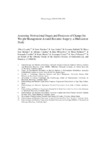Mostrar o rexistro simple do ítem
Assessing motivational stages and processes of change for weight management around bariatric surgery: a multicenter study
| dc.contributor.author | Lecube, Albert | |
| dc.contributor.author | Sánchez, Enric | |
| dc.contributor.author | Andrés, Ana | |
| dc.contributor.author | Saldaña, Carmina | |
| dc.contributor.author | Morales, María José | |
| dc.contributor.author | Calañas, Alfonso | |
| dc.contributor.author | Miñambres, Inka | |
| dc.contributor.author | Pellitero, Silvia | |
| dc.contributor.author | Cordido, Fernando | |
| dc.contributor.author | Bueno, Marta | |
| dc.contributor.author | Caixás, Assumpta | |
| dc.contributor.author | Vilarrasa, Nuria | |
| dc.date.accessioned | 2021-06-18T08:49:57Z | |
| dc.date.available | 2021-06-18T08:49:57Z | |
| dc.date.issued | 2019-06-17 | |
| dc.identifier.citation | Lecube A, Sánchez E, Andrés A, Saldaña C, Morales MJ, Calañas A, Miñambres I, Pellitero S, Cordido F, Bueno M, Caixàs A, Vilarrasa N; Obesity Group of the Spanish Society of Endocrinology and Nutrition (GOSEEN). Assessing motivational stages and processes of change for weight management around bariatric surgery: a multicenter study. Obes Surg. 2019 Oct;29(10):3348-3356. | es_ES |
| dc.identifier.issn | 0960-8923 | |
| dc.identifier.uri | http://hdl.handle.net/2183/28101 | |
| dc.description.abstract | [Abstract] Introduction/purpose: The assessment of the patients' motivation as a predictor of behavioral change via five stages (pre-contemplation, contemplation, preparation, action, and maintenance) and four processes (emotional re-evaluation, weight management actions, environmental restructuring, and weight consequences evaluation) of change. Materials/methods: A total of 542 participants (251 waiting for bariatric surgery (BS), 90 undergoing BS, and 201 controls) completed the Stages (S-Weight) and Processes (P-Weight) of Change in Overweight and Obese People questionnaires in a multicenter cross-sectional study. Results: A higher percentage of subjects seeking BS (31.7%) were in the action stage (16.7% of post-BS patients, p < 0.001; 14.9% of controls, p < 0.001). The referred body mass index (BMI) reduction was higher in subjects in active stages (3.6 ± 4.4 kg/m2 in maintenance versus 1.4 ± 1.4 kg/m2 in contemplation, p < 0.001). In the P-Weight questionnaire, patients looking for BS scored significant higher in the four processes of change than controls. In addition, a positive and significantly correlation between BMI and the four processes was observed. In the stepwise multivariate analysis, BMI and the S-Weight allocation were constantly associated with the four processes of change. Conclusion: Obesity is accompanied by a modifying behavioral stage, suggesting that subjects before BS are seriously thinking about overcoming excess weight. To identify subjects on the waiting list for BS who will be more receptive to weight lost interventions remains a challenge. | es_ES |
| dc.language.iso | eng | es_ES |
| dc.publisher | Springer Nature | es_ES |
| dc.relation.uri | https://doi.org/10.1007/s11695-019-04001-4 | es_ES |
| dc.rights | This is a post-peer-review, pre-copyedit version of an article published in Obesity Surgery. The final authenticated version is available online at Springer Link website. | es_ES |
| dc.subject | Bariatric surgery | es_ES |
| dc.subject | Motivation stages | es_ES |
| dc.subject | Obesity | es_ES |
| dc.subject | Processes of change | es_ES |
| dc.subject | Weight loss | es_ES |
| dc.title | Assessing motivational stages and processes of change for weight management around bariatric surgery: a multicenter study | es_ES |
| dc.type | info:eu-repo/semantics/article | es_ES |
| dc.rights.access | info:eu-repo/semantics/openAccess | es_ES |
| UDC.journalTitle | Obesity Surgery | es_ES |
| UDC.volume | 29 | es_ES |
| UDC.issue | 10 | es_ES |
| UDC.startPage | 3348 | es_ES |
| UDC.endPage | 3356 | es_ES |






